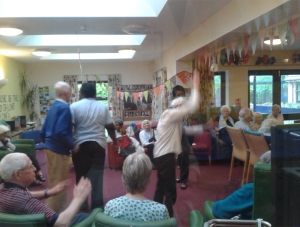 A huge highlight of my August was attending the 10th birthday celebrations of the wonderful day centre my mum so enjoyed. The invitations were carefully designed to spark reminiscence about past trips to the cinema and other happy experiences – and at the event I attended, Elvis was most certainly in the building!
A huge highlight of my August was attending the 10th birthday celebrations of the wonderful day centre my mum so enjoyed. The invitations were carefully designed to spark reminiscence about past trips to the cinema and other happy experiences – and at the event I attended, Elvis was most certainly in the building!
Why is Bay Tree Resource Centre so special? Every time my mum entered that building, she felt welcome, wanted and as if the whole team had just been waiting for her to arrive so that the day could properly begin. Each member is known as an individual; my mum wanted non-stop interaction and activity – but others prefer to sit in a quiet corner and watch the world go by, or to simply know that they’re amongst company. The skilled staff team remain alert to each individual’s needs and preferences and care is tailored accordingly.
I looked at all available day centres before managing to get a place at Bay Tree for Mum; none of the others would have been at all suitable and I wouldn’t have taken a place at them. Dementia care can and should be a celebration and appreciation of each individual person, and here I’d found that. I have no doubt whatsoever that without a place at Bay Tree, Mum would have had to go into residential care at least 18 months sooner than she did; as her carer, this was my respite and without it I would not have been able to continue as sole carer – but a place at an unsuitable centre would have been no respite at all, because I could not have rested unless Mum was happy.
 Day centres aren’t a luxury; by offering tailored day-care, they can help to keep people out of residential care and to remain well; even though Mum had always forgotten about her day by the time she got home, her whole demeanour was unmistakably lifted by the day’s activities for several hours afterwards.
Day centres aren’t a luxury; by offering tailored day-care, they can help to keep people out of residential care and to remain well; even though Mum had always forgotten about her day by the time she got home, her whole demeanour was unmistakably lifted by the day’s activities for several hours afterwards.
How does this relate to hospital care? Someone living with dementia can find it very hard to self-entertain, even at home. Take that person out of their familiar environment and routine and it can become impossible for them to independently find a way to relax; they may well be in a state of high alert throughout their hospital stay.
I am greatly heartened by the move in several Trusts to recognise the importance of appropriate activities for people living with dementia who find themselves hospitalised. Two wonderful new activities coordinators at Betsi Cadwaladr Health Board have recently embraced the Butterfly Scheme as part of their engagement with patients – a real understanding of why suitable interaction and activity will support this person during their hospital stay. In Calderdale and Huddersfield NHS Foundation Trust , social engagement by a team of sixth formers, also applying the Butterfly Scheme as part of their approach, has led to very impressive results which the Trust’s Butterfly Scheme Lead will report on at the UK Dementia Congress in November.
 The general well-being of people with dementia will affect their health and recovery. I am certain that the provision of tailored interactive support as part of their hospital care will soon be more widely recognised not only as something a civilised society should be offering, but also as economically beneficial to the healthcare providers.
The general well-being of people with dementia will affect their health and recovery. I am certain that the provision of tailored interactive support as part of their hospital care will soon be more widely recognised not only as something a civilised society should be offering, but also as economically beneficial to the healthcare providers.
Congratulations and thanks to all those who already recognise that.
